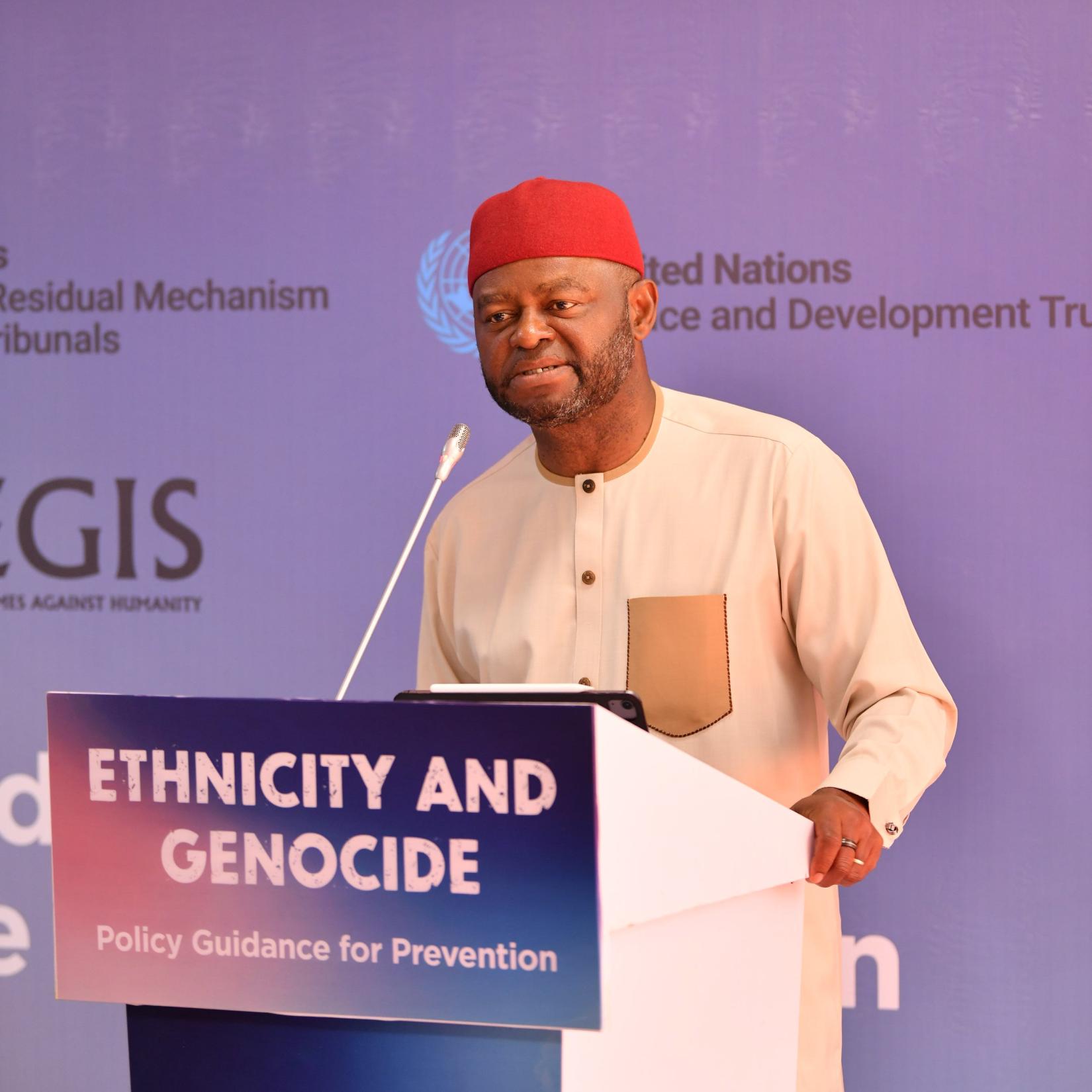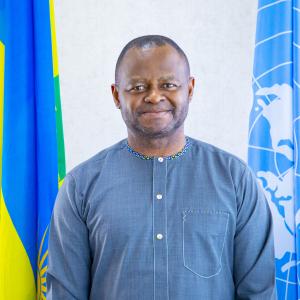Remarks by UN Resident Coordinator Ozonnia Ojielo at the Conference on “Ethnicity and Genocide: Policy Guidance for Prevention” 8th November 2024
.

- Honorable Jean Damascène Bizimana, Minister of National Unity and Civic Engagement
- Ms. Alice Wairimu Nderitu Under-Secretary-General and Special Adviser on the Prevention of Genocide
- Dr. Serge Brammertz, UN Under Secretary General, Chief Prosecutor of the International Residual Mechanism for Criminal Tribunals
- Mr. Freddy Mutanguha, CEO of the Aegis Trust and Director of the Kigali Genocide Memorial
- Senior Government Officials here present
- Participants from different academic institutions
- Distinguished Ladies and Gentlemen
Good Morning, Mwaramutse,
1. I am honored to join you today as we gather to address one of humanity’s most pressing challenges: preventing genocide and safeguarding ethnic diversity. Our presence here is not only a tribute to the memory of past victims but also a testament to our shared commitment to action. We are here to ensure that the horrors of the past fuel our determination to build a more just, resilient, and peaceful future.
2. Genocide, as we know, does not occur in a vacuum. The tragic events of 1994 during the genocide against the Tutsi in Rwanda remind us of a painful truth—that ethnic diversity, while it should enrich our societies, can be twisted into a tool of division and hatred. Today, we honor the memories of those lost by confronting the lingering risks and developing practical solutions to prevent recurrence. Together, we aim to transform remembrance into active resilience, ensuring that "never again" is not just a promise, but a call to persistent vigilance.
3. Our world is shaped by contestation for power and resources based on interest. Given that the resources are limited, power is often used to significantly advance the promotion, protection and sustenance of interests and access to resources. Access to power therefore becomes central to individual and group advancement. The contestations often take place based on mobilization. The easiest way to mobilize people and groups is usually along identity lines: ethnicity, religion, race, etc., and the demonization of opposed groups, to guarantee access to power. The intensity of the contestation can often lead to violence and armed conflict and in some cases, genocide.
4. It is important to note at the outset that the outbreak of violence is not an inevitable outcome of these contestations and divides, intrinsic or imagined. Rather, the outbreak of violence is often the culmination of increasing social, economic, and political tensions that have been radicalized along these ethnic and other identity lines. While the history of inter-group relations could be a precursor of potential conflict on the scale that may lead to genocide, it is the actions of actors and groups in state and non-state institutions and organizations that leverage this history to create acceleration for a descent into genocide. In such situations, the relationship between ethnicity and power can be internalized, institutionalized, and radicalized to become the foundations for governance and can cement antagonistic relationships between all the groups in the society. This politicization of ethnicity can then lead to mass participation in genocide as it results from a cumulative radicalization of society.
5. The policy guidance we aim to develop here is therefore not a theoretical exercise but an urgent and practical undertaking. Genocide begins with small signs—hate speech, dehumanization, political marginalization, and the dangerous manipulation of ethnic identities. These early warning signs, highlighted by the Office of the Special Advisor for the Prevention of Genocide, and including the existence of historic, pervasive, and institutionalized prejudice and the ‘moral exclusion’ of a category of people leading to social and political marginalization, show us that we need coordinated policies and comprehensive frameworks that can prevent violence before it escalates to atrocity.
Dear Under-Secretary-General, Honorable Minister, Distinguished Ladies and Gentlemen; permit me to reflect for a moment on what I am Learning from Rwanda’s Path to Resilience
6. Last month, I had the opportunity to join senior government officials at the Justice, Reconciliation, Law, and Order Sector (JRLOS) retreat. There, we reflected on Rwanda’s journey and celebrated the resilience of this nation—a resilience shaped by collective pain but reinforced through unity and determination. Presentations during the retreat showcased Rwanda's extraordinary progress, underscoring the strength of this nation in rebuilding from its darkest days.
7. One highlight was the recent study by Interpeace and the Ministry of National Unity and Civic Engagement, titled “ Strengthening Resilience: A Community-based Participatory framework for Assessment of Resilience in Rwanda.” It reveals that resilience in this country is sustained not only by strong governance but also by the active participation of communities in building and assessing their resilience. This study emphasizes the importance of social cohesion, unity, and intergenerational dialogue as foundational pillars in preventing conflict. It shows that when communities are engaged in resilience-building, they become capable of transforming vulnerabilities into strengths, reducing the risk of ethnic violence.
8. This “Community Resilience Assessment Framework” captures the voices of over 7,000 Rwandans—men, women, and youth—who shared their stories of strength, healing, and growth. It reveals that resilience is deeply intertwined with values of empathy, tolerance, and forgiveness, which are central to Rwanda's healing journey. This Framework is a powerful reminder that preventing genocide requires robust institutions but also empowered communities equipped to foster peace and unity.
Dear Under-Secretary-General, Honorable Minister, Distinguished Ladies and Gentlemen
9. My personal conviction as we are moving from remembrance to prevention is that our efforts to prevent future atrocities must operate at every level—individual, community, and national. National action plans that prioritize inclusivity, foster open dialogue, and actively combat hate speech are essential to building peaceful societies. Additionally, we must strengthen regional and global partnerships to develop early warning systems that can detect and respond to escalating ethnic tensions. The scars of conflict know no borders, and our responsibility to prevent such tragedies must be equally unbounded.
10. So, this is a call to government institutions, international organizations, civil society, and individuals everywhere to engage in active solidarity.
- We must build a world where diversity is celebrated, not exploited. By creating and implementing comprehensive frameworks, we can address historical grievances, correct socio-economic inequalities, and promote political inclusivity. These objectives are not just ideals—they are the foundational steps toward a future in which genocide and ethnic violence become chapters in history that never repeat.
- We must make a commitment to the future: let us carry with us a renewed commitment to preserve not only the memory of those lost to genocide but also to act decisively in preventing future atrocities.
- Together, we must build a world where policies reflect compassion, inclusivity, and respect for human dignity—where resilience is nurtured at every level of society, and where diversity serves as a bridge that unites rather than divides us.
- Together, we must uphold the courage to act, the strength to prevent, and the unity to protect.
Dear Under-Secretary-General, Honorable Minister, Distinguished Ladies and Gentlemen
11. Let me conclude by emphasizing that it is important to remember that the work we do here today is not the end but a crucial step in an ongoing journey. Prevention is a continuous process—one that requires vigilance, collaboration, and an unyielding commitment to peace.
12. Let us leave this conference with a shared resolve to act boldly and collectively, ensuring that the promise of "never again" becomes a lived reality for future generations. The tools are in our hands, the lessons are before us, and the time to act is now.
Thank You. Murakoze Cyane
Speech by





